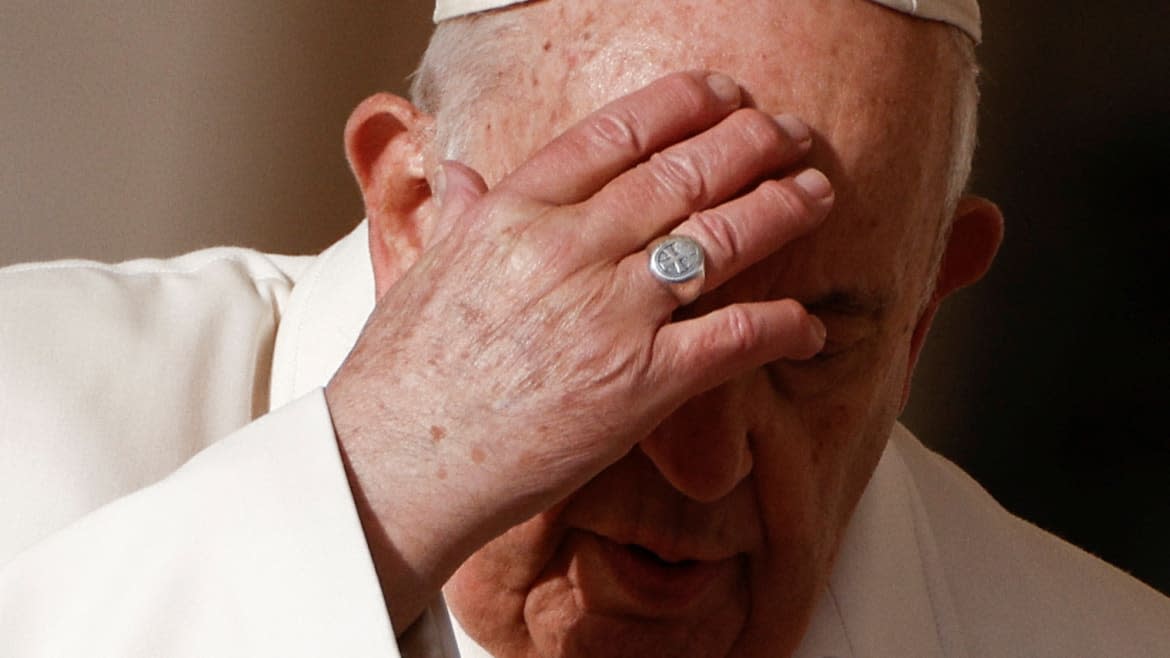The Vatican Is Buzzing With Conspiracy Theories as Hackers Take Down the Pope’s Website

- Oops!Something went wrong.Please try again later.
ROME—It is no secret that Pope Francis has been ruffling feathers on the global stage in recent weeks. He has angered Russia, Ukraine and China over his comments in the last month alone. So when the Vatican’s official website went dark on Wednesday, it was hard to determine just which of the pope’s enemies might be behind it.
While the Vatican spokesperson initially said the site was undergoing maintenance and technical difficulties, he finally admitted that the Holy See had been hacked. “Technical investigations are ongoing due to abnormal attempts to access the site,” Matteo Bruni said in a statement late Wednesday.
But those “abnormal attempts” could be a warning of more to come. The prime suspect is Russia, which has a history of conducting cyber warfare against enemies of its state. The holy hack came just 24 hours after Francis angered the Kremlin by singling out Chechens and Buryati troops within the military contingent invading Ukraine, leading to accusations of “race baiting” against the pontiff.
Ukraine Angry After Pope Francis Calls Darya Dugina ‘Innocent’ War Victim
But China also has a bone to pick with the pope after he recently criticized the appointment of Peng Weizhao as a bishop in the state-sanctioned Chinese Catholic church, which is in direct breech of an agreement between the Vatican and China in 2018 that requires papal approval for such installments. Instead, the Holy See issued a strong statement saying the news was met “with surprise and regret,” and that the new bishop is “not recognized by the Holy See.” The statement issued last weekend went on to say, “The Holy See hopes that similar episodes will not be repeated, and awaits appropriate communications on the matter from the authorities and reaffirms its full willingness to continue respectful dialogue concerning all issues of common interest.”
China has a history of making trouble in the Vatican. In 2020, the U.S. group Recorded Future found that hackers with links to the Chinese government had successfully hacked the Holy See email server. They also allegedly hacked into the Catholic Diocese of Hong Kong, which has been traditionally in line with the Vatican over the Chinese government’s views on Catholicism in the region. That hack went unpunished, but it did cause the Holy See to beef up its cybersecurity. It is now one of the most teched up portals in Italy, with high paid technicians and multi-language content producers working around the clock to make sure the virtual flock is attended to.
But global powers aren’t the only suspects of note. There is plenty of acrimony within the fortified walls of the Vatican itself, and some suspect the hack could have come from within. An ongoing criminal trial against Cardinal Angelo Becciu and nine others over financial impropriety which includes a hunk of money paid to free a kidnapped nun in Mali, is heating up, and a secretly taped telephone call between Becciu and Francis set ears buzzing inside the Vatican.
But as veteran Vaticanisti John Allen surmised in his column on the hack, it could have been something else. “Of course, it’s also equally possible we’re talking about some 16-year-old kid in his parents’ basement, who simply thought it would be cool to see if he could bring down the Vatican’s online operation,” Allen wrote. “The fact that thoughts automatically turn to geopolitics and international intrigue rather than more prosaic (and simpler) possibilities is, once again, a reminder of the vibrancy of the Vatican conspiracy theory industry.”
Whoever did it, the damage was vast. The Holy See website is a one-stop shop for everything Catholic. Information about the Vatican museums, archival speeches and writings of the current and previous popes, Catechism teachings, and daily news bulletins draw hundreds of thousands of visitors every day. It is one of the primary ways to make reservations to visit the Vatican museums, meaning revenue was also surely impacted.
The Vatican is not expected to confirm, deny, or comment on any information they find about who was behind the holy black out.
Get the Daily Beast's biggest scoops and scandals delivered right to your inbox. Sign up now.
Stay informed and gain unlimited access to the Daily Beast's unmatched reporting. Subscribe now.

